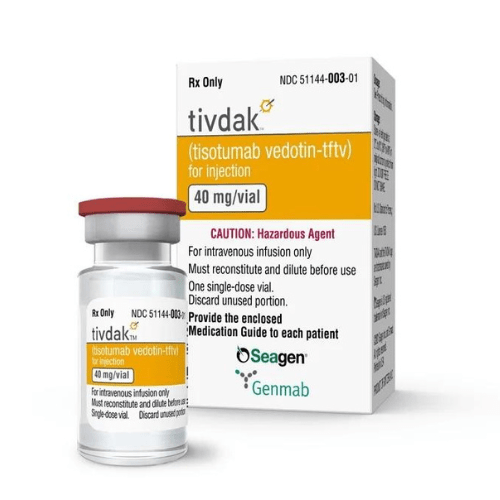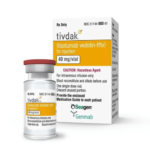About Tisotumab vedotin-tftv
- Tisotumab vedotin, marketed as Tivdak, represents an antibody-drug conjugate employed in the treatment of cervical cancer.
- This advanced therapeutic agent integrates tisotumab, a monoclonal antibody specifically targeting tissue factor, with monomethyl auristatin E (MMAE), a potent inhibitor of cell division.
- Tisotumab administration is achieved through intravenous infusion.
- In September 2021, Tisotumab vedotin received approval for medical use in the United States, earning recognition from the U.S. Food and Drug Administration as a first-in-class medication.
- Tisotumab vedotin-tftv stands out as a tissue factor (TF)-directed antibody drug conjugate (ADC), featuring a human IgG1 antibody directed against the cell surface TF, a primary initiator of the extrinsic blood coagulation cascade.
- The small molecule MMAE, acting as a microtubule-disrupting agent, is intricately linked to the antibody through a protease-cleavable linker.
- Nonclinical data underscores that the anticancer efficacy of tisotumab vedotin-tftv is rooted in the binding of the ADC to TF-expressing cancer cells.
- This process is succeeded by the internalization of the ADC-TF complex, leading to the subsequent release of MMAE through proteolytic cleavage.
- MMAE, in turn, disrupts the microtubule network of actively dividing cells, inducing cell cycle arrest and apoptotic cell death.
- Complementing these mechanisms, in vitro studies reveal that tisotumab vedotin-tftv facilitates antibody-dependent cellular phagocytosis and antibody-dependent cellular cytotoxicity.
Strength:
The injection is available as a 40 mg lyophilized cake or powder in a single-dose vial for reconstitution.
Recommended Dosage:
Ophthalmic examinations, including visual acuity and slit lamp assessments, should be conducted at baseline, before each Tivdak dose, and as clinically indicated. Prescribe and renew corticosteroid eye drops after a slit lamp examination, administering the first drop in each eye before each infusion. Instruct patients to continue using prescribed eye drops for 72 hours post-infusion. Administer topical ocular vasoconstrictor drops before each infusion and use cooling eye pads during Tivdak infusion. Additionally, advise patients to apply lubricating eye drops throughout the therapy and for 30 days after the last Tivdak dose. Caution patients against wearing contact lenses unless advised by their eye care provider for the entire treatment duration.
Tivdak is to be administered exclusively as an intravenous infusion, emphasizing its classification as a hazardous drug and necessitating adherence to specific handling and disposal protocols. The reconstitution process involves using Sterile Water for Injection, with subsequent dilution in an intravenous infusion bag containing 5% Dextrose Injection, 0.9% Sodium Chloride Injection, or Lactated Ringer’s Injection. Reconstituted vials may be refrigerated for up to 24 hours or stored at room temperature for a maximum of 8 hours before dilution, with a strict prohibition on freezing. The infusion, administered over 30 minutes through an intravenous line with a 0.2 µm in-line filter, necessitates confirmation of prior administration of steroid and vasoconstrictor eye drops.
Cold packs are to be applied over the eyes during the infusion, changed as necessary to maintain the desired cooling effect. Storage of the diluted Tivdak solution in refrigeration is specified, with a 4-hour time limit for completion of administration once removed from refrigeration. Rigorous visual inspections for particulate matter and discoloration are emphasized throughout the preparation process, with any abnormalities leading to the discard of the respective vials or infusion bags.
- Avoid administering Tivdak through intravenous push or bolus, and refrain from combining it with or administering it concurrently with other medicinal products.
- The recommended dosage of Tivdak is 2 mg/kg (up to a maximum of 200 mg), delivered as an intravenous infusion over 30 minutes every 3 weeks until disease progression or unacceptable toxicity occurs.
Important:
Prior to initiating Tivdak injection, promptly communicate any adverse reactions to your doctor. If you observe unusual symptoms while undergoing treatment, consult your doctor immediately. Share details of pre-existing health conditions before commencing treatment, ensuring comprehensive information for safe administration. Maintaining open communication about your health is essential for personalized care and addressing any concerns that may arise during the treatment process.
Warnings & Precautions
- Do not take this medicine if you are allergic to Tisotumab vedotin-tftv or any of its ingredients.
- Peripheral neuropathy should be diligently monitored in patients receiving Tivdak for any indications of new or worsening symptoms.
- Adjustments in treatment, such as withholding, dose reduction, or permanent discontinuation of Tivdak, should be considered based on the severity of peripheral neuropathy.
- Additionally, vigilance is essential for detecting signs and symptoms of hemorrhage, and appropriate action, including withholding, dose reduction, or permanent discontinuation of Tivdak, should be taken in accordance with the severity observed.
- Pneumonitis, which may be severe, life-threatening, or fatal, necessitates the withholding of Tivdak for persistent or recurrent Grade 2 pneumonitis, along with the consideration of dose reduction. Permanent discontinuation of Tivdak is recommended for Grade 3 or 4 pneumonitis.
- Furthermore, caution is advised regarding embryo-fetal toxicity, emphasizing the potential harm to a fetus. Patients should be informed of this risk, and effective contraception should be utilized.
- Close monitoring for adverse reactions is particularly crucial when Tivdak is co-administered with strong CYP3A4 inhibitors.
Common Tivdak Side Effects:
- Decreased red blood cell and white blood cell counts
- Tiredness
- Nausea
- Numbness/tingling in hands or feet, muscle weakness
- Hair loss
- Nosebleeds
- Eye problems (dry eyes, redness, irritation, corneal ulcers)
- Bleeding (increased risk of bruises, cuts, gum bleeding)
- Changes in kidney function blood tests
- Diarrhea
- Rash
- Constipation
- Fever
- Vomiting
- Cough
- Appetite loss
- Abdominal pain
- Dizziness
- Headache
- Difficulty sleeping
- Muscle/joint pain
Use in Specific Population
- Due to its mechanism of action and observed effects in animal studies, Tivdak has the potential to cause harm to a developing fetus if administered to pregnant women.
- There is a lack of data on the presence of tisotumab vedotin-tftv in human milk, its impact on the breastfed child, or its effects on milk production. Considering the potential for severe adverse reactions in breastfed infants, lactating women are advised not to breastfeed during Tivdak treatment and for 3 weeks following the last dose.
- It is essential to confirm the pregnancy status of females of reproductive potential before initiating Tivdak treatment.
- Contraception recommendations include advising females of reproductive potential to use effective contraception throughout Tivdak treatment and for 2 months after the final dose.
- Male patients with female partners of reproductive potential should also use effective contraception during Tivdak treatment and for 4 months after the last dose.
- Notably, Tivdak, based on animal studies, may adversely affect male fertility, as indicated in nonclinical toxicology data.
- Regarding pediatric use, the safety and effectiveness of Tivdak in pediatric patients remain undetermined, and its use is not recommended.
- Additionally, Tivdak should be avoided in patients with moderate or severe hepatic impairment. For those with mild hepatic impairment, close monitoring for adverse reactions is advised, although no adjustment to the starting dose of Tivdak is recommended.
Storage and Handling
- Store them in a refrigerated environment at temperatures ranging from 2ºC to 8ºC (36ºF to 46ºF), within the original carton to shield them from light exposure.
- Avoid freezing the vials and refrain from shaking them.
- Keep the medicine away from pets and children.
Our pharmaceutical procurement process is meticulously designed, encompassing four crucial stages to ensure a streamlined and efficient experience:
- Inquiry: When seeking information about a specific medication, our dedicated Named Patient Access Program Support team responds promptly, typically providing assistance within 24 hours.
- Validation: Sansfro ensures the availability and authorization of medicines, especially for patients in need of medications not readily accessible in their home countries. We meticulously verify prescriptions and medical details with precision, strictly adhering to compliance standards.
- Acquisition: Following successful validation, our team utilizes its extensive supplier network to procure the required medication. We engage in negotiations for favorable quotes and oversee the smooth processing of orders.
- Secure Dispatch: After finalizing the quote, we efficiently coordinate the secure dispatch of your medication. Our logistics specialists are available for consignment tracking. To maintain the integrity of medication provision, we strictly adhere to Standard Operating Procedures within the Named Patient Access Program.
To facilitate the smooth importation of medication, patients are required to provide the following documents:
- A valid copy of the prescription.
- Identification records.
- Information about the primary healthcare provider.
- Current residence address.
Upon receiving all the necessary documents, the Sansfro team promptly initiates the application process for the import license, a crucial prerequisite for obtaining the necessary medication, pending government approval.
No news found.
About Sansfro
Sansfro is committed to bridging the healthcare gap. Our purpose is to bring hope and healing to patients suffering from rare diseases by linking them with life-saving treatments through our Named Patient Program. Join us in our quest for a better and healthier world.
Know More...FAQ'S
What is Tivdak cervical cancer?
Tivdak is a medication used for the treatment of cervical cancer. It is an antibody-drug conjugate designed to target and combat cervical cancer cells effectively.
How is Tivdak administered?
Tivdak is administered through intravenous (IV) infusion into a vein over 30 minutes. The usual frequency is every 3 weeks, with the healthcare provider determining the number of infusions needed. Cold packs are applied to the eyes during each infusion, and dose adjustments or temporary cessation may occur if side effects manifest.
What are the possible side effects of Tivdak?
Tivdak may cause serious side effects, including eye problems, peripheral neuropathy, bleeding, and lung issues. Common side effects include changes in blood cell counts, fatigue, nausea, hair loss, nosebleeds, kidney function alterations, dry eyes, abnormal blood clotting test results, diarrhea, and rash. It is important to promptly report any unusual symptoms or side effects to the healthcare provider.
How does Tivdak affect fertility?
Tivdak may cause fertility problems in males, potentially impacting the ability to father children. Individuals with concerns about fertility should discuss this with their healthcare provider.
What precautions should be taken during Tivdak treatment?
Avoid contact lens use unless advised by an eye specialist. Strongly recommend effective contraception for both females and males with reproductive potential during and after Tivdak treatment. Breastfeeding is not recommended. Inform the healthcare provider if there’s a history of vision issues, numbness, bleeding, liver problems, or pregnancy before starting Tivdak. Regularly communicate any new or worsening symptoms to maintain optimal health during treatment.
What is the Tivdak price in India?
Evaluating the cost of Tivdak in India involves considering multiple factors, including medicine cost, import duties and taxes, exchange rates and currency variations, and demand-supply trends. For accurate and detailed pricing information, we encourage you to contact our Patient Support Team using the provided contact details: (+91) 93157 05373 or help@sansfro.com. Our team of experts is dedicated to providing professional assistance, offering specific details tailored to address your inquiries comprehensively.
How can I buy Tivdak online?
If you consider purchasing Tivdak online, a medication exclusively available in the US and Europe. We recommend contacting the Sansfro Health team or other reputable companies specializing in drug importation from these regions for a secure and reliable procurement process. Seeking guidance from experts is crucial, and Sansfro Health is recognized as a trustworthy entity committed to facilitating access to genuine pharmaceuticals.

Dr Anchal Aryan
Medical counselor
Patient Stories
Word Wide Delivery:
India, Andorra, Argentina, Australia, Austria, Azerbaijan, Bahrain, Brazil, Bulgaria, Cambodia, Canada, Chile, Colombia, Costa Rica, Croatia, Cyprus, Denmark, Dominican Republic, Estonia, Finland, France, Georgia, Germany, Ghana, Greece, Guatemala, Iraq, Ireland, Israel, Italy, Jamaica, Japan, Jordan, Kenya, Kuwait, Latvia, Lebanon, Libya, Lithuania, Malawi, Mexico, Montenegro, Nepal, Netherlands, New Zealand, Nigeria, Norway, Oman, Pakistan, Paraguay, Peru, Poland, Qatar, Romania, Saudi Arabia, Serbia, Singapore, Slovenia, Spain, Sri Lanka, Sweden, Switzerland, United Arab Emirates, United Kingdom, United States, Venezuela, Zimbabwe, Afghanistan, Albania, Algeria, American Samoa, Angola, Anguilla, Antarctica, etc.



